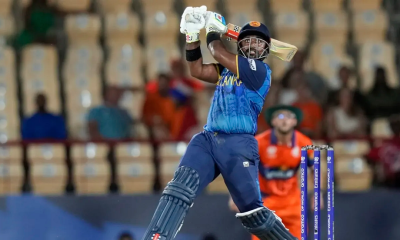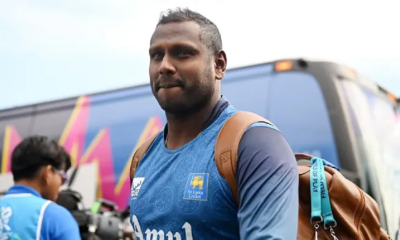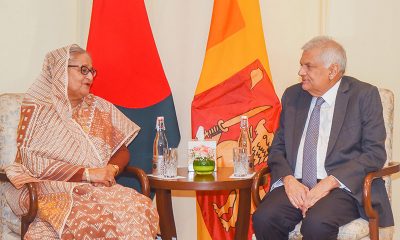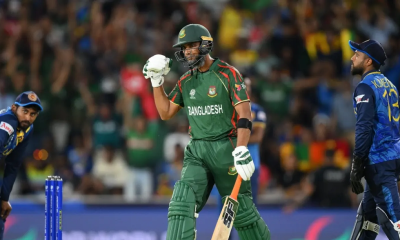Opinion
Are we the most gullible on earth?

By Dr Upul Wijayawardhana
I wish experts on human behaviour introduced a gullibility index, as this surely would have been the one, we could easily have topped! We have been fooled by politicians of all hues who have mastered the art of exploiting gullibility. We have been brainwashed to believe that family bandyism is an integral part of success in politics. We have been fooled into putting caste before the country. Our votes are cast not on policies but on the subtle, and the not so subtle, bribes. Whilst other countries borrow for developmental purposes, we borrow to repay political bribes and are in an abyss now, as a result. Even at this darkest hour, our politicians have put self-interest first, instead of getting together to save the country. Seeing no light at the end of the tunnel, professionals are fleeing in droves and soon we will be a country bereft of talent, on top of being financially bankrupt!
It is not only the politicians who exploit the gullibility of the masses. Paradoxically, even the intelligentsia are at it. Look at the proliferation of professors in Sri Lanka! It has become such an epidemic that University Grants Commission is reportedly considering laying down guidelines. How they are going to implement, I wonder! There are plenty of dubious universities the world over, awarding pseudo-degrees and appointing professors! Ayurvedic Medical faculties do not produce Ayurvedic doctors, all labelling themselves as doctors and practicing non-Ayurvedic medicine. Further, plenty of bogus doctors abound, practicing very successfully with no training at all!
It reminds me of a colleague of ours, who went on a Chinese government fellowship to study acupuncture for three months. On return, not only he became a specialist in the field but also set up an institution to teach and award degrees. Seeking legitimacy, he invited President J. R. Jayewardene, who happened to be the Minister of Higher Education, to award degrees at the convocation.
The danger of this was discussed at a Sri Lanka Medical Association council meeting and it was left for Dr N J Wallooppillai, as the President, and me, as the secretary, to appeal to President Jayewardene. Fortunately, we were able to approach President Jayewardene and convince him that he would be awarding degrees from an institution not recognised by the UGC. As it was too late to cancel, he attended but did not take part in the awarding of degrees!
Of course, gullibility is at its peak when it comes to religion which, in a way, is no surprise. After all, religion is the first and strongest brainwashing we get in life. More often than not, the religion we practise is based on birth, not on conviction as it should be. Gullibility is best exploited in this situation by so-called conversions. I have no problem with conversions based on convictions but most conversions are simple exploitations. Many rewards are offered in some religions for conversions resulting in conversions through, from marriage to trickery; almost all miracles falling within this category. The worst offenders are the cults and the only thing that has not happened in Sri Lanka is people killing themselves before the world ends!
There is much hype these days about a self-proclaimed prophet, supposed be close to some politicians too and he is accused of insulting other religions. Some politicians are up in arms demanding punishment which seems more for their political gain. Out of curiosity, I carefully watched YouTube video and am quoting verbatim what he stated, as media did not do so. During his preaching to a large cheering crowd, where Sinhala translation followed each line, he stated:
“This is what separates Christianity from Buddhism. This is what separates Christianity from Islam. Let us take Islam for instance. You can’t even call Allah, father! Are you hearing this? You have 99 names for God in Islam and yet, love is not one of them! This is what separates Christianity from Buddhism. Because for a Buddhist in their mind, it is like, Okay, annunta kala de tamanta palade In a sense it is true, especially if you do something to a prophet anyway. Now, but in the Buddhist mind they never hear the love of Buddha. Are you hearing me? Their focus is on enlightenment. Now, to be enlightened you need light. The Buddha himself, the name Buddha means enlightened one. Ladies and gentlemen, what is greater? Light or enlightenment? Jesus said ‘I am the light of the world.’ So, I tell you now, Jesus did not say I am the enlightened one.
No, no, no, Jesus came from a different wavelength. He said I am the light. So, I submit to you, the Buddha was looking for light. He was actually looking for Jesus. This is why every Buddhist needs Jesus. This is why every Muslim needs Jesus. This is Christianity that separates itself from Hinduism. Glory to Lord! Hindus are very close to the gospel. Buddhists are also very close to the gospel. Muslims are very close to the gospel. Very close.
That is why you need preachings like this. Let them take the next step. Sit down! Hinduism, the reason why they venerate so many animals. They don’t realise and hopefully after I said this will realise why they have a god that looks like an elephant. The reason why they have gods with ten thousand hands. They are not far from the truth. Why they venerate cows? They are very close but they are still far away. But what separates Christianity from Hinduism? It is this reality of life. Agape love. Some of you should tell your loving Hindu people, what you are doing may be true to you but there is a deeper truth. Never prosecute anybody. Never shame another person’s faith.”
As for me, these are not the words of a prophet, nor a preacher but the ramblings of an ill-informed individual who is making a living out of the gullible. The cheers for some of his ill-conceived statements amply demonstrate the gullibility of the audience. Their behaviour is in sharp contrast to our youth; I have been most impressed by the knowledge of Buddhism displayed by non-Buddhist children in quiz shows. In my opinion, the best way to handle ill-informed persons is to ignore them. In fact, past events support this. In January 2000, a series of chain emails spread the rumour that imported bananas were infecting people with ‘flesh-eating’ bacteria, adding that the FDA was trying to cover up the epidemic to avoid panic and encouraging readers to spread the word to their friends and family. FDA issuing a denial which only made matters worse!
Coming back to the pseudo-prophet, he displays gross ignorance as he implies light is needed for enlightenment! Light gets rid of darkness and that is not enlightenment!! He completely overlooks the fact that the Buddha was there six centuries before Christ, making it impossible for the Buddha to look for Christ!
After insulting all religions, the pseudo-prophet demonstrates the height of his hypocrisy by stating: “Never shame another person’s faith”!
Opinion
Appreciation: D. L. O. Mendis Visionary Engineer, Philosopher, and Mentor

Today, we honour the life and legacy of D.L.O. Mendis, a visionary engineer and philosopher whose contributions defined the standards of our profession. D.L.O. possessed a rare combination of analytical rigor and creative foresight. His numerous technical papers presented here and abroad related to water resources development stand as enduring monuments to his brilliance.
Beyond creating blueprints and technical specifications, D.L.O. presented bold ideas that challenged and strengthened our professional communities. He was a dedicated mentor to junior engineers, and a leader who firmly believed that engineering was, above all, a service to humanity. While we mourn this great loss, we take solace in knowing that his radical influence shaped our careers and the ethical code that governs our profession.
A Career of Integrity and Excellence
Throughout his career spanning more than 70 years, D.L.O. embodied the highest standards of integrity and technical excellence. He was particularly instrumental in advancing our
understanding of ancient irrigation systems, bridging the gap between historical wisdom and modern development.
Academic and Professional Journey
D.L.O.’s educational journey began at Ladies’ College(which accepted boys in lower grades at the time) before he moved to Royal College. He later entered the University of Ceylon as a member of the pioneering first batch of engineering students in 1950, graduating in 1954 in a class of nearly 25 students.
His professional path was distinguished and diverse:
Irrigation Department:
Served for nearly 10 years.
River Valleys Development Board (RVDB):
Contributed during the construction of the Uda Walawe reservoir.
Ministry of Plan Implementation:
Served as Deputy Director under Director M. S. M. De Silva, where his main contribution was the promotion of appropriate technology, particularly the advancement of historical Kotmale ironwork which has existed since the era of Parakrama Bahu the Great, and the South Eastern Dry Zone Project. (SEDZ).
Consultancy:
Served as a freelance consultant.
Leadership:
A prolific contributor of a large number of technical papers to the Institution of Engineers, Sri Lanka (IESL), eventually serving as its President.
Personal Reflections and Anecdotes
My association with D.L.O. spanned more than 50 years. I first saw him riding a bicycle past Akbar Hall while I was an engineering student. I later learned his family was residing at Prof. Paul’s residence nearby while he was serving at Uda Walawe Reservoir Project as a senior engineer for the RVDB.
Through D.L.O., I had the privilege of meeting legendary professionals outside the Irrigation Department, includingthe exceptionally bright M.S.M. de Silva and the international economist, Dr. Lal Jayawardena (Mr. N.U.Jayawardena’s son).
A Tribute to a Legacy
We extend our deepest gratitude for Mr. D.L.O. Mendis’slifelong service and offer our sincerest condolences to his family and colleagues. His monumental work and numerous publications remain a lasting gift to future generations of engineers.
May he attain the supreme bliss of Nibbana!
G.T. Dharmasena,
Former Director General of Irrigation
Opinion
Nature’s revenge for human greed and the plight of the Third World

Now there is no doubt about the phenomenon of global warming, its far reaching effects and its causes. Yet Donald Trump says global warming is con and Europe, too, is dithering about what measures should be urgently taken to save Earth. Deliberations at the COP30 meeting in Brazil did not bring the desired results regarding emission of greenhouse gases. The biggest polluters like the US, who have not met the minimum goals regarding emissions, decided at the 2015 Paris Agreement, failed to provide guarantees that they will correct themselves in the coming years. Cyclones that hit Sri Lanka and other Asian countries last month are the direct result of unrestricted burning of fossil fuel and other activities that cause emission of carbon dioxide and other greenhouse gases. Extreme climate events hit poor countries like the proverbial lightning that strikes the begging bowl.
The last decade has seen some of the worst natural disasters in the history of mankind. The devastating impacts of the climate crisis reached new heights in 2024, with scores of unprecedented heatwaves, floods and storms across the globe, according to the UN’s World Meteorological Organization (WMO). Yet human greed which is the ultimate cause of global warming continues unabated and CO2 emissions reach new records. The WMO’s report on 2024, the hottest year on record, sets out a trail of destruction from extreme weather that took lives, demolished buildings and ravaged vital crops. More than 800,000 people were displaced and made homeless, the highest yearly number since records began in 2008.
The report lists 151 unprecedented extreme weather events in 2024, meaning they were worse than any ever recorded in the region. Heatwaves in Japan left hundreds of thousands of people struck down by heatstroke. Soaring temperatures during heatwaves peaked at 49.9C at Carnarvon in Western Australia, 49.7C in the city of Tabas in Iran, and 48.5C in a nationwide heatwave in Mali.
Record rains in Italy led to floods, landslides and electricity blackouts; torrents destroyed thousands of homes in Senegal; and flash floods in Pakistan and Brazil caused major crop losses.
Storms were also supercharged by global heating in 2024, with an unprecedented six typhoons in under a month hitting the Philippines. Hurricane Helene was the strongest ever recorded to strike the Big Bend region of Florida in the US, while Vietnam was hit by Super Typhoon Yagi, affecting 3.6 million people. Many more unprecedented events will have passed unrecorded.
The world is already deep into the climate crisis, with the WMO report saying that for the first time, the 10 hottest years on record all occurred in the last decade. However, global carbon emissions have continued to rise, which will bring even worse impacts. Experts were particularly critical of the purge of climate scientists and programmes by the US president, Donald Trump, saying that ignoring reality left ordinary people paying the price.
“Leaders must step up – seizing the benefits of cheap, clean renewables for their people and economies – with new national climate plans due this year,” said the UN secretary general, António Guterres.
Extreme climate events like heat waves, intense rainfall, droughts, and severe storms have significantly increased in frequency and intensity over the past decades, driven by global warming, with studies showing a fivefold increase in climate disasters compared to the 1970s, and human influence now clearly linked to many specific events, according to reports from organisations like the UN, WMO, and Intergovernmental Panel on Climate Change. The number of recorded climate-related disasters (storms, floods, droughts, wildfires) surged from 711 in the 1970s to over 3,000 in the 2000s and 2010s.
The intensity of these events is also alarmingly rising. Heatwaves, heavy precipitation events, and sea-level impacts from cyclones are becoming more severe, with phenomena like extreme heat in North America now considered “virtually impossible” without human-caused climate change. Scientists can now more confidently attribute specific extreme events (like heatwaves in Europe or floods in Asia) to climate change, moving beyond general predictions to clear causation. The warming atmosphere holds more moisture, fueling more intense precipitation, while human activities (like burning fossil fuels) continue to warm the planet, loading the dice for extreme weather.
These disasters could have been considerably lessened if the signatories to the Paris Agreement on climate change signed in 2016 had fulfilled their commitment to the agreement. The goal of the UN agreement was to reduce the average global temperature rise well below 2 degrees C above pre-industrial levels. To achieve this, it was necessary to cut down CO2 emission by 20%, increase the renewable energy market by 20% and improve energy efficiency by 20%, the so called 20/20/20 targets. However, the agreement was non-binding for the individual countries.
Despite all this effort, green-house gas emissions reached an all-time record of 37 billion tons in 2018 and 41 billion tonnes in 2024. This has caused havoc all over the world, long dry periods affecting crops, desertification, forest fires alternating with torrential rain, huge floods and storms. Countries like China, the US, EU and India who in that order are the largest emitters of greenhouse gases have a great responsibility in saving the world from total destruction. Though China, EU and India appear to be on course to achieve Intended Nationally Determined Contributions towards emission reduction, they must do more in double quick time if global temperature rise is to be kept at 1.5C. In contrast President Trump in his usual bumbling and foolish attitude is planning to withdraw from the Paris Agreement. .
It has been calculated that if meat consumption is reduced by 20% carbon emission would be reduced by 5%. Cutting down on meat consumption would be good for health also and would lesson cruelty to animals. There are several similar measures that people and governments could do to mitigate this problem. But human greed seems to be uncontrollable. Obviously rich countries have the capacity to deal with extreme weather events and don’t care much about their devastating impact on poor countries.
In a country like Sri Lanka, for instance, when the waters rage, people have nowhere to go. Poor people with limited land resources cannot choose where to live. This is why hawkers whose wayside shops on the Kadugannawa climb were destroyed by recent earth slides are seen reconstructing the shops in the same places. There may not be sufficient land available to relocate all those who live in unsafe places like the foot of unstable hills, in river basins, sea beaches, etc. in a small country like ours. A significant portion of Sri Lanka’s population lives in disaster-prone areas, with nearly 19 million people residing in vulnerable spots like low-lying or landslide-prone regions, including hill slopes, making them highly susceptible to climate impacts. The National Building and Research Organisation (NBRO) has identified over 14,000 specific landslide-prone locations, affecting thousands of rural and estate homes, with thousands more at high or medium risk, especially in districts like Badulla, Kandy, and Kegalle.
To make life safe from extreme weather for at least the most vulnerable and the poorest may be beyond the means of our poor country with all its economic ills. Experts say we have to be prepared to live with climate change. Rather we may have to die with it unless the preventable is prevented ! According to climate scientists, global warming is preventable. The Director of the Penn Center for Science, Sustainability & the Media, Michael Mann is among many scientists who point to the “game-changing new scientific understanding” that global warming would stabilize relatively quickly (within a decade) if emissions were to reach net zero, meaning that the worst outcomes are avoidable if we act swiftly. The authors of the comprehensive IPCC reports emphasize that every fraction of a degree of warming that is prevented will save countless lives and protect vital ecosystems. These reports serve as the authoritative voice on climate science and policy recommendations.
The battle against global warming, it appears, has to be fought by the Global South as the North is not doing enough. It is the poor countries of the Global South that do not have the capacity to absorb the blows that nature delivers, and it is they who have to bear the brunt of the relentless onslaught. As I have mentioned in my earlier letters the Global South has to get together to fight the greed driven neo-liberalism which is the cause of so many ills including global warming. In this regard China, India, South Africa and perhaps Iran with the backing of Russia may have to take the leadership and construct an alternative to the present global economic system which would have to take strong cognition of the need to safeguard the environment and cut down on emissions drastically and quickly. This is not impossible if consumerism, which is the driver of neo-liberalism, could be controlled. To achieve this human greed will have to be restrained, perhaps by means of good morals. Unless the Global South realizes the impending peril and takes necessary measures we are doomed.
by N. A. de S. Amaratunga ✍️
Opinion
Remembering Douglas Devananda on New Year’s Day 2026

I have no intention of even implicitly commenting on the legality of the ongoing incarceration of Douglas Devananda.
I’ve no legal background, and that’s because having been selected for the Law faculty at the University of Colombo on the basis of my A level results, I opted to study Political Science instead. I did so because I had an acute sense of the asymmetry between the law and justice and had developed a growing compulsion on issues of ethics—issues of right and wrong, good and evil.
However, as someone who has had a book published in the UK on political ethics, I have no compunction is saying that as a country, as a society, there has to be a better way than this.
It is morally and ethically wrong, indeed a travesty, that Douglas, a wounded hero of the anti-LTTE war, should spend New Year 2026 in the dreaded Mahara prison.
Douglas should be honoured as a rare example of a young man, who having quite understandably taken up arms to fight against Sinhala racism and for the Tamil people, decided while still a young man to opt to fight on the side of the democratic Sri Lankan state and to campaign for devolution for the North and East within the framework of a united Sri Lanka and its Constitution.
Douglas was an admired young leader of the PLA, the military wing of the Marxist EPRLF when he began to be known.
Nothing is more ironic than the historical fact that in July 1983 he survived the horrifying Welikada prison massacres, during which Sinhala prisoners, instigated and incentivized from outside (Gonawela Sunil is a name that transpired), slaughtered Tamil prisoners and gauged out their eyes.
Having escaped from jail in Batticaloa, Douglas came back to Sri Lanka in 1989, having had a change of heart after hundreds of youngsters belonging to the EPRLF, PLOT, and TELO had been massacred from 1986 onwards by the hardcore separatist, totalitarian Tigers. He was welcomed by President Premadasa and Minister Ranjan Wijeratne who took him and his ‘boys’ under their wing. There are photos of Douglas in shorts and carrying an automatic weapon, accompanying Ranjan Wijeratne and the Sri Lankan armed forces after the liberation of the islands off Jaffna from the Tiger grip.
It is Douglas who kept those vital islands safe, together with the Navy, throughout the war.
Douglas stayed with the democratic Sri Lankan state, remaining loyal to the elected president of the day, without ever turning on his or her predecessor. He probably still wears, as he did for decades, the fountain pen that President Premadasa gifted him.
During the LTTE’s offensive on Jaffna after the fall of Elephant Pass, the mass base built up by Douglas which gave the EPDP many municipal seats, helped keep Jaffna itself safe, with more Tamil civilians fleeing into Jaffna than out of it. I recall President Chandrika Bandaranaike Kumaratunga giving him a satellite phone. Army Chief Lionel Balagalle gave him a pair of mini-Uzis for his safety.
Douglas was no paramilitary leader, pure and simple. His public speech on the occasion of the 50th anniversary of the founding of the Sri Lanka Freedom Party, delivered without a teleprompter, is an excellent roadmap for the graduated implementation of the 13th amendment and the attainment of maximum devolution within a unitary state.
Like Chandrika, Douglas has had his sight severely impaired by the LTTE. As a Minister he had visited Tamil detainees imprisoned in wartime, and been set upon by a group of LTTE prisoners who had planned for his visit, concealing sharpened handles of steel buckets in the ceiling, and slammed the pointed metal through his skull. Douglas still needs repeated daily medication for his eyes which were miraculously saved by the Sri Lankan surgeons who repaired his skull, but at a subsequent stage, he was also treated by surgeons overseas.
No Sri Lankan, Sinhala or Tamil, civilian politician or military brass, has survived as many attempted assassinations by the Tigers as has Douglas. I believe the count is eleven. There’s a video somewhere of a suicide bomber blasting herself in his office, yards away from him.
Under no previous Sri Lankan administration since the early 1980s has Douglas found himself behind bars. He has served and/or supported seven democratic Presidents: Premadasa, Wijetunga, Chandrika, Mahinda, Sirisena, Gotabaya and Wickremesinghe. He has been a Minister over decades and a parliamentarian for longer.
He was a firm frontline ally of the Sri Lankan state and its armed forces during the worst challenge the country faced from the worst enemy it had since Independence.
During my tenure as Sri Lanka’s ambassador/Permanent representative to the UN Geneva, Douglas Devananda came from Colombo to defend Sri Lanka in discussions with high level UN officials including UN Human Rights High Commissioner Navanethem Pillay. This was in April 23, mere weeks before the decisive battle of the UN HRC Special session on Sri Lanka which we won handsomely. The media release on his visit reads as follows:
A high-level delegation led by the Hon. Minister Douglas Devananda, Minister of Social Services and Social Welfare, which also included the Hon. Rishad Bathiudeen, Minister of Resettlement and Disaster Relief Services, H.E. Dr. Dayan Jayatilleka, Ambassador/ Permanent Representative of Sri Lanka to the United Nations Office in Geneva, Prof. Rajiva Wijesinha, Secretary to the Ministry of Disaster Management and Human Rights, and Mr. Yasantha Kodagoda, Deputy Solicitor General, Attorney General’s Department, represented Sri Lanka at the Durban Review Conference.
“Organized by the United Nations, the Durban Review Conference provides an opportunity to assess and accelerate progress on implementation of measures adopted at the 2001 World Conference against Racism, including assessment of contemporary forms of racism, racial discrimination, xenophobia and related intolerance. On the opening day of this conference, Hon. Douglas Devananda made a statement behalf of the Government of Sri Lanka.
“On the sidelines of the Durban Review Conference which is being held from 20th to 24th of April 2009, the Sri Lankan delegation met with senior UN officials, and a number of dignitaries from diverse countries and updated them on the current situation in Sri Lanka against the backdrop of Sri Lanka’s fight against separatism and terrorism.
Hon. Devananda and Hon. Bathiudeen, along with the rest of the delegation, held meetings with Ms. Navanethem Pillai, UN High Commissioner for Human Rights, Mr. Antonio Guterres, UN High Commissioner for Refugees (and a former Prime Minister of Portugal) and Mr. Anders Johnsson, Secretary-General of the Inter-Parliamentary Union.’
(https://live.lankamission.org/index.php/human-rights/676-minister-devananda-meets-un-high-commissioners-for-human-rights-and-refugees-2.html)
In contemporary world history, a leader from a minority community who defends the unity of his country against a separatist terrorist force deriving from that minority is hailed as a hero. A leader who takes the side of the democratic state, arms in hand, against a totalitarian fascistic foe, is hailed as a hero. Evidently, not so in current-day Sri Lanka.
[Dayan Jayatilleka, Sri Lanka’s former Ambassador to the UN Geneva; France, Spain, Portugal and UNESCO; and the Russian Federation, was a Vice-President of the UN Human Rights Council and Chairman, ILO.]
by Dr Dayan Jayatilleka ✍️
-

 Sports5 days ago
Sports5 days agoGurusinha’s Boxing Day hundred celebrated in Melbourne
-

 News3 days ago
News3 days agoLeading the Nation’s Connectivity Recovery Amid Unprecedented Challenges
-

 Sports6 days ago
Sports6 days agoTime to close the Dickwella chapter
-

 Features4 days ago
Features4 days agoIt’s all over for Maxi Rozairo
-

 News6 days ago
News6 days agoEnvironmentalists warn Sri Lanka’s ecological safeguards are failing
-

 News4 days ago
News4 days agoDr. Bellana: “I was removed as NHSL Deputy Director for exposing Rs. 900 mn fraud”
-

 News3 days ago
News3 days agoDons on warpath over alleged undue interference in university governance
-
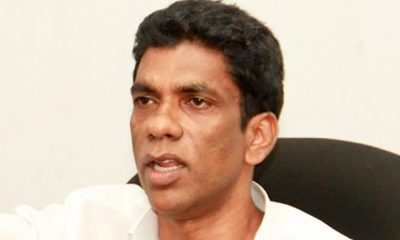
 Features6 days ago
Features6 days agoDigambaram draws a broad brush canvas of SL’s existing political situation


